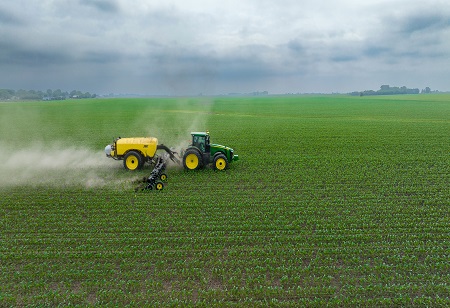
In a bid to give an impetus to organic farming, the Union Cabinet Committee on Economic Affairs (CCEA) has granted approval to the PM-PRANAM initiative. The initiative is designed to encourage states to adopt alternative, non-chemical fertilizers. The committee has also decided to extend the existing urea subsidy for a period of three years, commencing from FY23. The allocated budget for this subsidy amounts to Rs 3.68 trillion. In addition, the CCEA made two additional decisions pertaining to the fertilizer sector. Firstly, a subsidy of Rs 1,451 crore was approved to encourage the usage of organic manure. Secondly, the committee decided to introduce sulphur-coated urea (Urea Gold) to combat sulphur deficiency in the soil and minimize reliance on urea.
Organic fertilizers are increasingly being utilized to improve crop yields and there is a huge potential to use them as an alternative to conventional inputs. However, as their adoption in agriculture grows in India, there are several challenges hindering their widespread adoption.
Cost and Affordability
Organic fertilizers are often more expensive than conventional chemical fertilizers. The higher cost can pose a financial barrier for farmers, especially small-scale and resource-constrained farmers. Making organic fertilizers more affordable and providing financial support or subsidies can help mitigate this challenge and encourage wider adoption.
Investing in research and development to optimize organic fertilizer production methods and scale-up operations can lead to cost reductions over time. Implementing localized production facilities can further cut transportation expenses, making organic fertilizers more accessible and cost-effective for farmers. Education and training programs can also teach farmers about composting techniques and on-farm resource recycling, reducing the need for external inputs and minimizing overall expenses.
Collaborative efforts between agricultural experts, policymakers, and industry stakeholders are essential to create innovative financing models that support farmers in transitioning to organic practices. By fostering affordability and acknowledging the long-term environmental and soil health benefits, we can pave the way for sustainable agriculture and a greener future.
Certification and quality control
Organic fertilizers must be in compliance with particular standards and regulations in order to be certified as an organic fertilizer. The manufacturing certification process can be complicated and expensive for manufacturers. Moreover, providing quality and uniformity for organic fertilizers is a daunting task since the organic materials are prone to variations and composting methods not standardized.
To cut the certification process shorter, the governments and certification bodies should work together to create the standardized directions which are both practical and achievable for manufacturers. Provision of financial incentives or grants to small scale producers can propel them to join in the scheme of organic fertilizer and certification.
Implementing strict quality control measures and routine inspections will ensure the purity of organic fertilizer products that are certified. With the utilization of technological improvements like blockchain and IoT devices, the supply chain can be more transparent and traceable which gives consumers and producers the trust they need in the product's authenticity. Investing in research and innovation will provide the opportunity to build reliability and effectiveness of organic fertilizers that will be essential in sustainable agriculture.
Scaling up organic fertilizer production
Meeting the increasing demand for organic fertilizers requires scaling up production capacity. This includes sourcing sufficient organic materials, setting up composting facilities, and ensuring quality control. Developing the necessary infrastructure and supply chains for large-scale organic fertilizer production can be a challenge.
Collaboration between farmers, waste management industries, and agricultural experts is crucial to establish a steady supply of organic materials for production. Public-private partnerships can aid in funding and constructing composting facilities that efficiently convert organic waste into high-quality fertilizers. Implementing best practices and technology-driven solutions can optimize production processes, enhancing productivity and reducing costs.
Training programs for farmers on composting and recycling can create a decentralized approach to fertilizer production, supplementing commercial endeavors. Knowledge-sharing platforms and networks can foster innovation and knowledge transfer within the industry, catalyzing the growth of sustainable agriculture through the widespread availability of organic fertilizers.
One of the countries that have had substantial progress in the organic fertilizer production is Denmark. Denmark has become known as an excellent example of modernised agricultural practices and the use of sustainable farming techniques. The country has devoted much of its effort in research and development, centering on improving the production technologies of organic fertilizers and increasing the quality of organic commodities.
The Danish farmers have had a progressive approach to organic farming, focusing on resource efficiency, recycling and minimizing environmental impacts. They have designed innovative composting approaches, utilizing agri-waste and organic waste from both households and industries as raw materials to produce nutritionally rich organic fertilizers.
Now is the right time for Indian agriculture industry to take cue from the examples of these countries and adopt sustainable agricultural practices. The Indian agricultural sector with its massive farming area and rich organic wastes give a wonderful opportunity for the output of organic fertilizers on a large scale. Partnerships between research institutions, private companies and farmers will create a strong innovating force and accelerate the development of efficient and cost-effective organic fertilizer production systems. Organic fertilizer production is on course to assume a key position in the Indian agriculture that is leaning towards a more ecofriendly and sustainable path as it will be responsible for improving the soil health and ensuring food security.
We use cookies to ensure you get the best experience on our website. Read more...